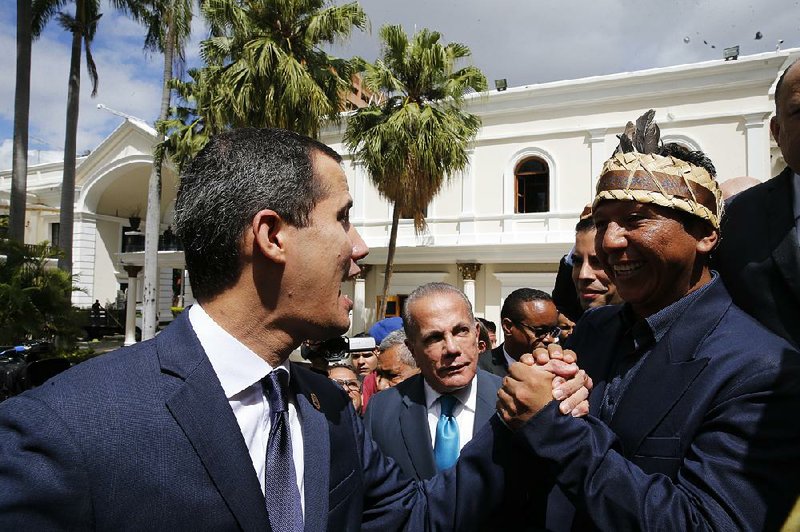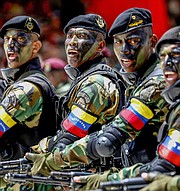GENEVA -- A top Venezuelan diplomat on Friday blasted what he called the "biased vision" of a report by the U.N. human-rights chief chronicling torture, sexual abuse and extrajudicial killings in the country and demanded it be "corrected."
Deputy Foreign Minister William Castillo insisted that the report from High Commissioner for Human Rights Michelle Bachelet "does not reflect the reality in our country." He said Venezuela would heed "constructive" recommendations.
"We demand that its contents be corrected, and we urge you to act in a balanced and respectful way," Castillo told the U.N.-backed Human Rights Council through a translator.
"The content of this report is incomprehensible, dominated by a selective and biased vision," Castillo said. "It's a text lacking in scientific rigor, with serious errors in methodology and which seems like a carbon copy of previous reports."
Bachelet, after presenting the report published Thursday to the council, insisted that she heard from victims on both government and opposition sides, and defended the methodology. Since taking office last year, Bachelet said, she has emphasized that staff members need to get the facts right to show balance.
Also Friday, Bachelet announced that Venezuela, under international pressure, has freed 22 people the opposition considers political prisoners. That brings the release of political prisoners in recent weeks to 84.
Bachelet's announcement came as embattled President Nicolas Maduro appeared in a military celebration on Venezuela's independence day, while opposition leader Juan Guaido led a march against the socialist leader.
The rights chief said her teams had been working on the report, which covers a period from January 2018 nearly to the present, for a long time. She insisted upon the validity of the reporting, based on hundreds of interviews and meetings with government officials, Maduro's opponents, as well as victims, their relatives, rights defenders and many others.
She also expressed hope that the report could help pave the way toward improvements in the rights situation in Venezuela, and noted that her office now has an office in Venezuela -- access not granted for many years.
She summarized her team's findings about a "pattern of torture" under Maduro's government, citing violations like arbitrary detention, extrajudicial killings, sexual violence and enforced disappearances.
Witnesses recounted "in every case" how special forces known as FAES "manipulated the crime scene and evidence," the report said. "They would plant arms and drugs and fire their weapons against the walls or in the air to suggest a confrontation and to show the victim had 'resisted authority.'"
"In many cases, FAES brought the victims to hospital even though they were already dead, apparently with the intention of manipulating the bodies and modifying the crime scene," it added.
Venezuela's government acknowledged nearly 5,300 killings during security operations last year alone linked to "resistance to authority," the report said, and added that another 1,569 took place from Jan. 1 to May 19 this year.
MILITARY PARADE
Maduro oversaw a military parade to mark the country's independence day Friday.
Maduro applauded and pumped his fist as soldiers marched past, tanks rolled by and fighter jets streaked overhead at a Caracas military base. A unit of camouflaged special forces, guns drawn, shouted their loyalty as they paraded by the presidential reviewing stand.
"We look to the heavens, asking for peace," Maduro said. "All the while our military exercises play out. We plead to God with our missiles pointed."
The parade served as a demonstration of Maduro's continuing support from the military amid a political standoff with Guaido, who is trying to oust Maduro and has the backing of more than 50 nations, including the United States.
Guaido claimed presidential powers in January, at the time drawing throngs of supporters for demonstrations against Maduro, who has overseen the oil-rich nation's historic collapse. More than 4 million Venezuelans have left the country amid food and medicine shortages and crushing inflation.
As head of the opposition-controlled National Assembly, Guaido claims that Maduro's election in 2018 to a second, six-year term is illegitimate because the most popular political figures and parties were barred from running.
Maduro refuses to step aside, blaming Venezuela's woes on an economic war against the country led by President Donald Trump's administration, and Guaido has not been able to lure a critical mass of soldiers to back him.
In his brief address, Maduro renewed his call for a dialogue with the opposition. As he spoke, members of Venezuela's militia each held a cardboard box of the type used to distribute government-subsidized food.
Colombian authorities say a few hundred soldiers have abandoned Maduro in recent months.
Most notably, Maduro's spy chief, Gen. Manuel Cristopher Figuera, fled after a failed military uprising staged April 30 with Guaido and another popular opposition leader, Leopoldo Lopez. Now in the United States, Figuera says his mission is to "seek help to free my country from disgrace."
Security forces turned out at just 15% of 89 anti-Maduro demonstrations nationwide Friday, a dramatic departure from the government's zero-tolerance stance, according to figures Guaido's team provided to The Associated Press, which could not independently confirm them.
National Assembly lawmaker Marco Quinones said that shows the government's fear of international repercussions after the U.N. report, or it is proof of eroding support for Maduro among soldiers, who no longer want to repress their fellow citizens with tear gas and shotguns.
Across town, Guaido called on Venezuelans to take to the streets with him Friday for demonstrations marking 208 years since Venezuela won its freedom from Spain.
A few thousand joined him, far fewer than the number who turned out at demonstrations earlier this year. They marched toward the headquarters of a military intelligence agency in Caracas, where days earlier a navy captain opposed to Maduro was tortured to death, according to his wife and attorney.
Grasping a microphone with his shirt sleeves rolled up, Guaido urged the military to join his movement, saying that anyone in Venezuela who continues to support this "dictatorship" is an accomplice to human-rights abuses.
"We're marching for freedom," Guaido said. "We're turning our outrage into a movement, and we'll be on the streets until we achieve freedom."
The marchers included families, students and members of the clergy. No immediate violence was reported. Previous opposition marches broke out in deadly clashes with police.
Among the demonstrators backing Guaido was Melquiades Rosales, whose small business selling shower doors is failing. As a symbol of the country's mourning, Rosales waved a Venezuelan flag made with shades of gray instead of the original vibrant yellow, blue and red.
"So many of us are filled with hopelessness," Rosales said, adding that he hasn't given up. "But we're in this for a long-term fight. This dictatorship is so well-rooted in all the institutions."
Information for this article was contributed by Scott Smith, Joshua Goodman and Fabiola Sanchez of The Associated Press.
A Section on 07/06/2019

